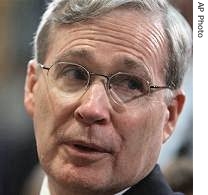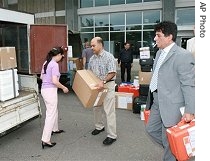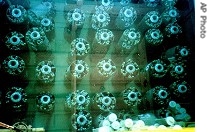2007年VOA标准英语-US Says N. Korea Shutdown of Yongbyon Reactor a(在线收听)
Washington
15 July 2007
U.S. National Security Advisor Stephen Hadley says Washington still has concerns about North Korea's nuclear program, despite Pyongyang's decision to shut down its main plutonium reprocessing facility. VOA's Stephanie Ho reports from Washington.
 |
| Stephen Hadley (file photo) |
"The inspectors from the International Atomic Energy Agency are on the scene with their equipment," he said. "They will go to the facility and they will be able to confirm that in the next few days, but it appears that the facility is shut down."
Shutting down the reactor was part of a February 13 deal agreed to by the six nations involved in talks on the North Korean nuclear crisis. These countries include the United States, North Korea, China, South Korea, Japan and Russia. They are to meet again Wednesday in Beijing .
 |
| Adel Tolba, right, head of the International Atomic Energy Agency's (IAEA) inspection team, loads equipment onto a truck upon arrival in North Korea |
Speaking on Fox News Sunday, Hadley called the shutdown of the Yongbyon reactor a good first step. He warned that Washington is still concerned about a separate North Korean program to enrich uranium, which can also be used for nuclear weapons.
"It means they [North Korea] will no longer be able to reprocess to produce the nuclear weapons of those nuclear weapons that are made out of plutonium," he said. "We have concerns that they may have a covert enrichment program."
The Bush administration says North Korea also has a nuclear program that relies on highly-enriched uranium. Pyongyang only publicly acknowledges its plutonium program.
Hadley stressed that the six-party agreement also requires North Korea to provide a full accounting of all of its nuclear weapons, nuclear processing plants, and stored nuclear material it has already accumulated. He said that would include any uranium enrichment efforts, which he added will be one of the next subjects of discussion.
 |
| North Korea's spent nuclear fuel rods, which are kept in cooling pond, are seen at nuclear facilities in Yongbyon (file photo) |
The deal calls for North Korea to eventually receive one million tons of fuel oil. U.S. officials also are working on the possibility of replacing the armistice agreement that ended the Korean War with a formal treaty.